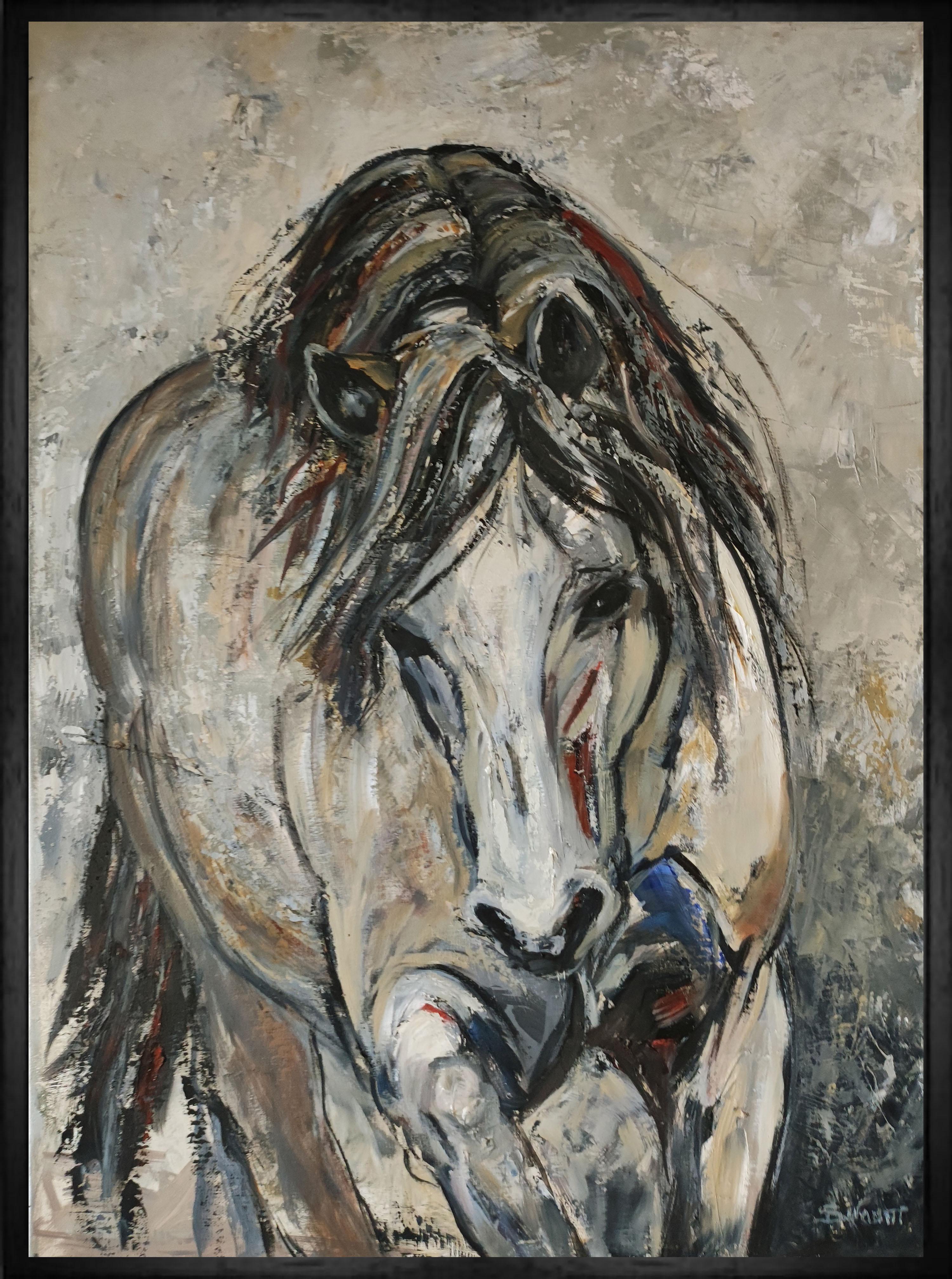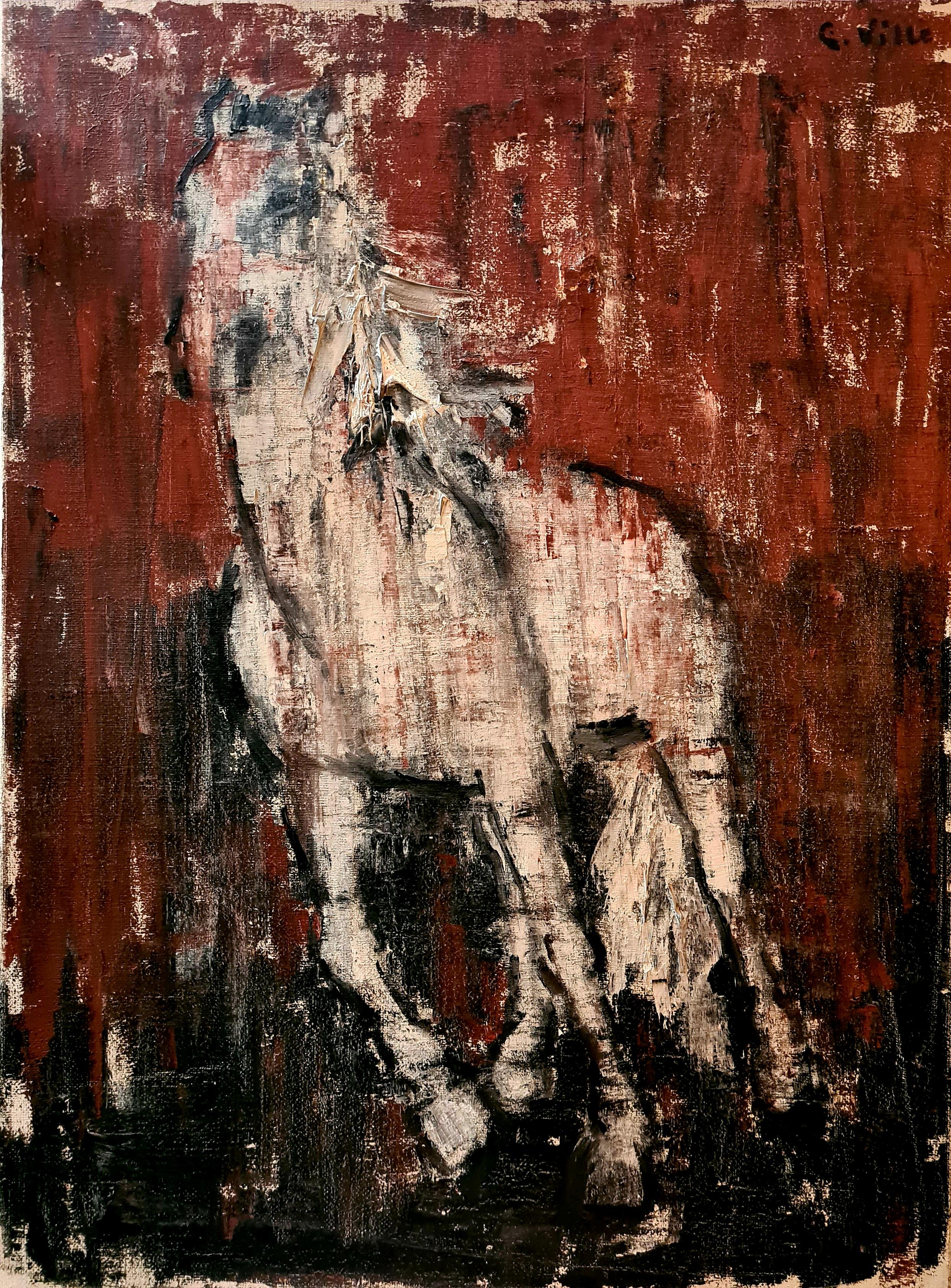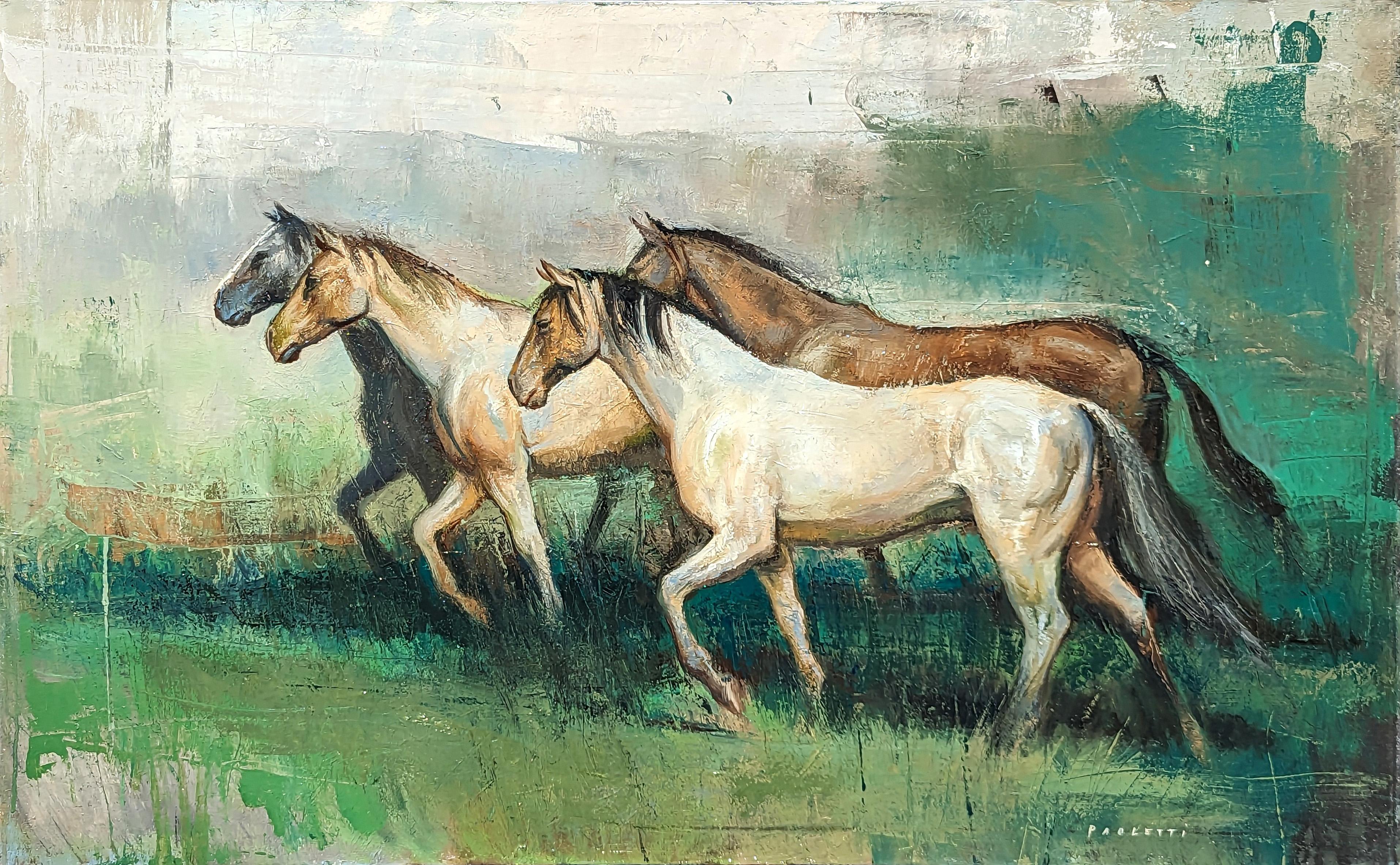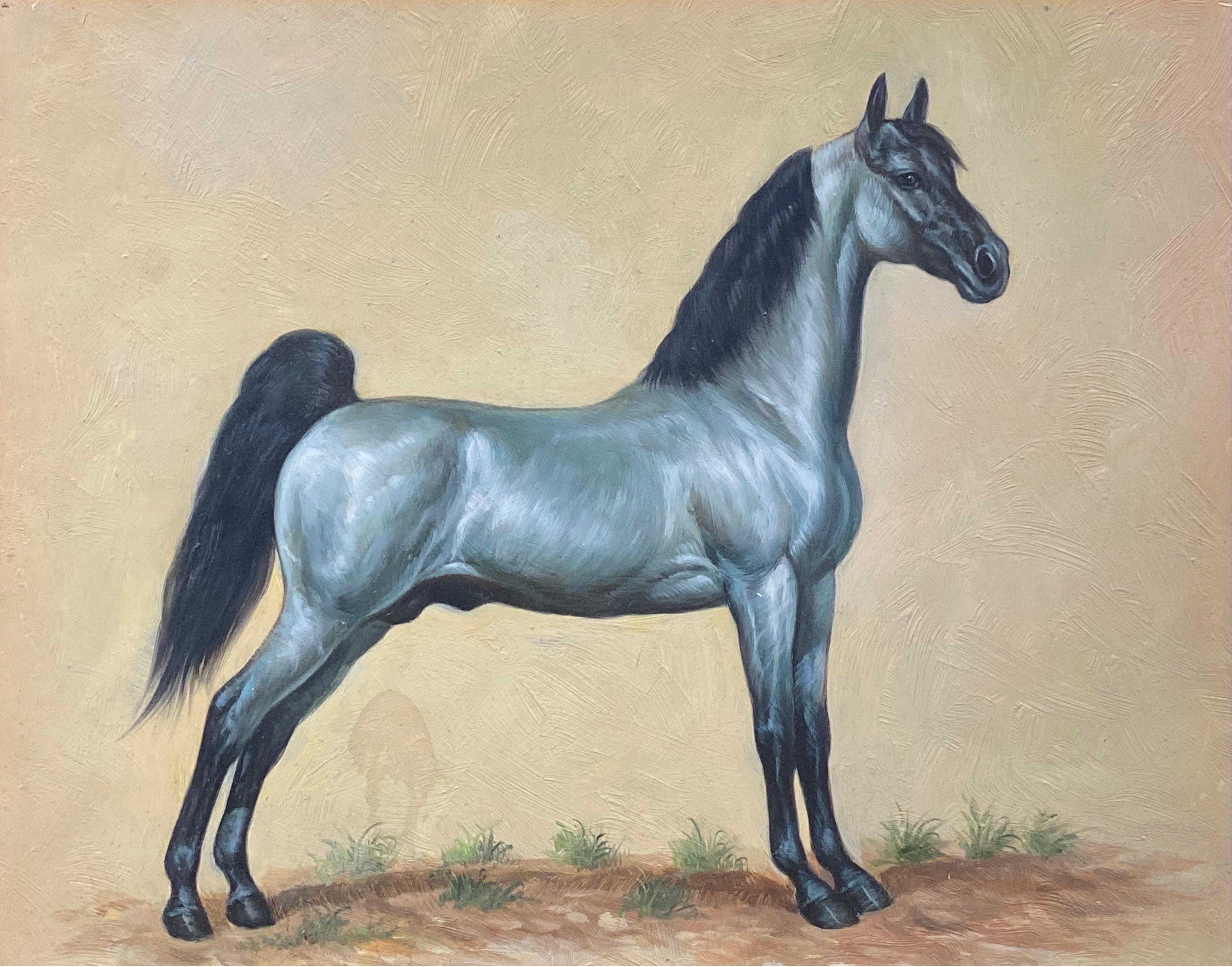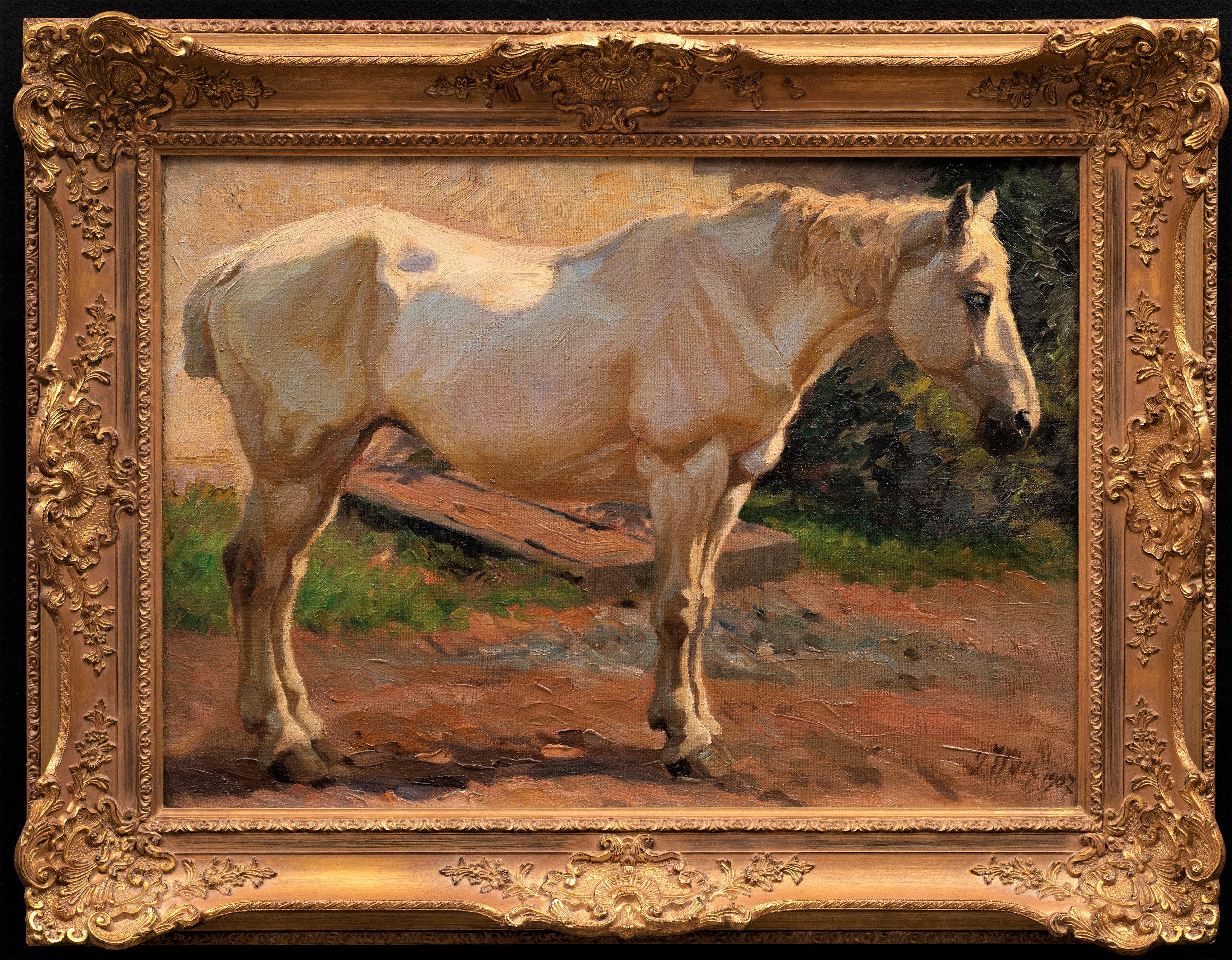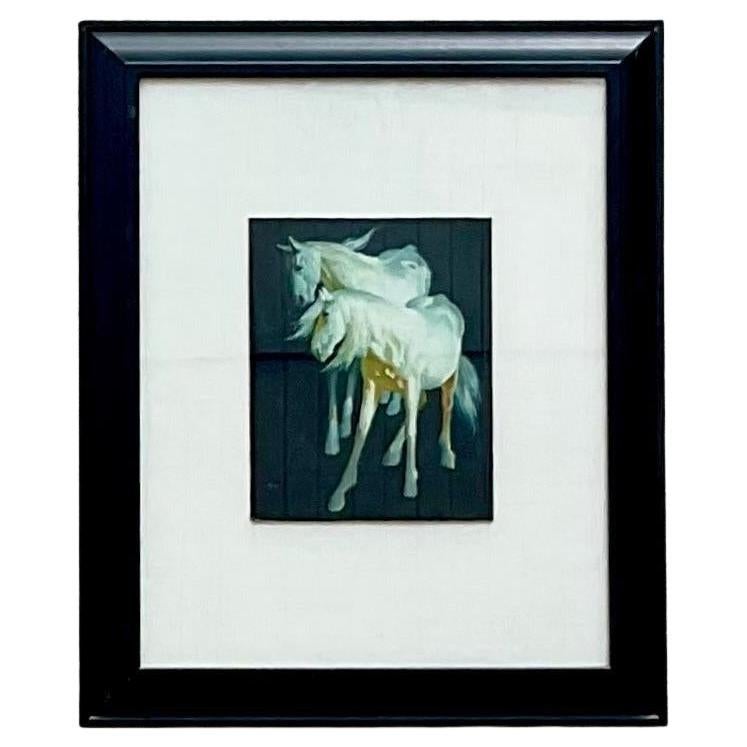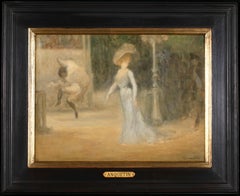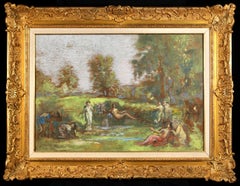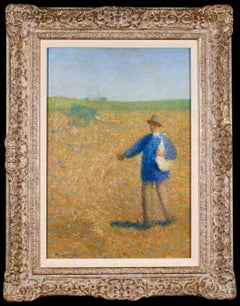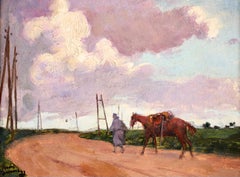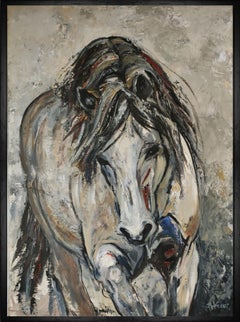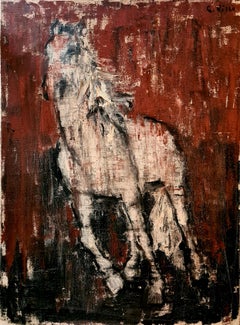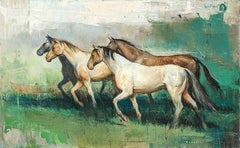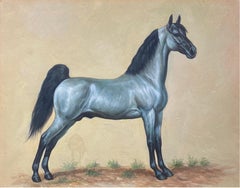Items Similar to Les Trois Chevaux - Modernist Animal Oil Painting by Louis Anquetin
Want more images or videos?
Request additional images or videos from the seller
1 of 12
Louis AnquetinLes Trois Chevaux - Modernist Animal Oil Painting by Louis Anquetinc.1895
c.1895
$10,512.14
£7,725
€9,075.59
CA$14,441.89
A$16,123.01
CHF 8,448.22
MX$197,361.52
NOK 107,292.44
SEK 101,163.15
DKK 67,732.08
About the Item
Signed oil on panel circa 1895 by French modernist painter Louis Anquetin. The piece depicts three white horses.
Signature:
Signed lower right
Dimensions:
Framed: 16.5"x20"
Unframed: 10.5"x14"
Provenance:
The estate of the painter
This work is included in the catalogue raisonne of the work of Louis Anquetin under preparation by Galerie Brame et Lorenceau
Louis Anquetin went to school in Rouen. He was given an allowance by his father, a well-off shopkeeper, to go and study painting in Paris. In 1882 he entered the free academy run by Cormon, where he was heavily influenced by the Impressionists, particularly Monet, whom he revered, but also Degas (especially his Japonist periods). Anquetin was extremely talented and made an impression on Van Gogh, who met him during his time in Paris, and Toulouse-Lautrec, a close friend who also admired his work. Some sources claim that Anquetin, Van Gogh, Toulouse-Lautrec and Émile Bernard met at Cormon's academy. Because of his great skill, Anquetin experimented with many of the techniques he encountered, perhaps at the expense of developing a real personality of his own. In 1887 the rigours of Pointillism and Seurat's theories on 'scientific Impressionism' seduced him, but not for long. In 1888 he met Émile Bernard and his friends, and discovered that they all shared an enthusiasm for the work of Gauguin, his contemporary subjects and flat areas of colour with bold outlines, which was known at the time as Gauguin's Synthetism. Artists would gather at the Café Volpini, where they also exhibited their Symbolist/Synthetist paintings. Following on from their reflections on the works of Gaugin, Bernard and Anquetin defined one aspect of his work under the term 'Cloisonnism'. The question of which of them came up with this term would later be heavily disputed.
Anquetin exhibited at the Salon des Artistes Indépendants for the first time in 1888. In 1891 he showed his works at the gallery Le Barc de Boutteville alongside the Nabis. He exhibited at the Salon of the Société Nationale des Beaux-Arts from 1890 to 1914, and became a member in 1907. In 1892 he exhibited at the Rose+Croix Salon at the Galerie Durand-Ruel. In 1812 he participated in the Salon d'Automne, where the theme was the 19th-century portrait. Here he showed his Portrait of Monsieur Janvier in the Role of Lampourde, which was probably painted before 1900 and is perhaps the same work as his 1887 Portrait of an Actor. As a result of these official events, Anquetin received a commission from the Gobelins manufactory for a tapestry cartoon on the subject of War and Peace, and was decorated with the Légion d'Honneur. Private commissions included a ceiling painting of Rinaldo and Armida in the house of Baron Empain in Brussels, a theatre curtain for the Théâtre Antoine in Paris, which was bought by the city authorities, and decorations for the Cercle Artistique in Nice.
In 1888 Anquetin's style was very similar to that of Émile Bernard, as can be seen, for example, in the former's Reaper in the Fields of 1886. The distinction between the two artists came with Anquetin's Portrait of an Actor and Woman in the Street. Then, in 1890, for a variety of reasons (his interest in anatomy, his desire to return to composition and grand subjects, and a quest for movement), Anquetin took to studying the 17th-century Flemish masters such as Rubens and Jordaens. He broke with the innovators for good and progressively returned to traditionalism. He was 30 at the time, and his youthful sense of adventure had gone. By 1896 he had abandoned all interest in modernity, as can be seen in his painting Fighting, which he exhibited in 1896. From that point on he permanently adopted the Rubenesque model in terms of his themes, the way that he arranged his compositions, and the details of his backgrounds and ornaments. He studied Rubens' technique in minute detail, for example Rubens' use of glazes to create transparent effects and give his colours a light, airy quality. When invited to write an essay on Rubens for the Comoedia review, Anquetin lamented the lack of interest in technique shown by his contemporaries and called for the establishment of a technique class at the École des Beaux-Arts.
Anquetin's artistic journey followed a trajectory parallel to that of his friend Émile Bernard. Like Anquetin, Bernard suddenly abandoned his youthful exuberance for an almost obsessive return to tradition, in his case a focus on 17th-century Spanish artists like Murillo, and Bolognese painters such as the Carracci, who founded the Accademia dei Desiderosi. Was Anquetin consciously abandoning modernism, or was he simply a casualty of the public's disaffection with modern art? Whatever the reason, he ended his days a solitary misanthrope. However, his talent still sometimes shone through, particularly when he was able to tap into human reality, as with his Self-portrait and Portrait of the Actor Firmin Gémier in 'La Rabouilleuse'. The paintings are nostalgic proof of what Signac once said about Anquetin: 'If a creative spirit had only a tenth of his talent, he would produce wonders.'
Museum and Gallery Holdings:
La Rochelle: Towers of La Rochelle
London (Tate Collection): Girl Reading a Newspaper (1890, pastel/paper); The Finish of the Horse Race (c. 1898-1899, watercolour/board); studies
Paris (MNAM-CCI): Racing; Child in Profile; Still-life Study; Woman in the Street; Portrait of the Marguerite Brothers; Study of a Male Nude Leaping (drawing); Bust of a Woman in Profile (pen); Cavalry Battles (pen)
- Creator:Louis Anquetin (1861 - 1932, French)
- Creation Year:c.1895
- Dimensions:Height: 16.5 in (41.91 cm)Width: 20 in (50.8 cm)
- Medium:
- Movement & Style:
- Period:
- Condition:Very good condition.
- Gallery Location:Marlow, GB
- Reference Number:Seller: LFA04801stDibs: LU415315871962
About the Seller
5.0
Gold Seller
Premium sellers maintaining a 4.3+ rating and 24-hour response times
Established in 2001
1stDibs seller since 2016
705 sales on 1stDibs
Typical response time: <1 hour
- ShippingRetrieving quote...Shipping from: Marlow, United Kingdom
- Return Policy
Authenticity Guarantee
In the unlikely event there’s an issue with an item’s authenticity, contact us within 1 year for a full refund. DetailsMoney-Back Guarantee
If your item is not as described, is damaged in transit, or does not arrive, contact us within 7 days for a full refund. Details24-Hour Cancellation
You have a 24-hour grace period in which to reconsider your purchase, with no questions asked.Vetted Professional Sellers
Our world-class sellers must adhere to strict standards for service and quality, maintaining the integrity of our listings.Price-Match Guarantee
If you find that a seller listed the same item for a lower price elsewhere, we’ll match it.Trusted Global Delivery
Our best-in-class carrier network provides specialized shipping options worldwide, including custom delivery.More From This Seller
View AllElegante sur Les Grands Boulevards - Modernist Figurative Oil by Louis Anquetin
By Louis Anquetin
Located in Marlow, Buckinghamshire
Signed oil on panel circa 1895 by French modernist painter Louis Anquetin. This beautiful piece depicts an elegant lady dressed in a blue dress and hat walking in the Grand Boulevard...
Category
1890s Modern Figurative Paintings
Materials
Oil, Panel
Fete Champetre - Symbolist Figurative Oil Painting by Ker Xavier Roussel
By Ker Xavier Roussel
Located in Marlow, Buckinghamshire
Signed symbolist oil on panel circa 1910 by French Les Nabis painter Ker-Xavier Roussel. This beautiful painting depicts nudes and figures dressed in robes in a wooded landscape.
Signature:
Signed lower left
Dimensions:
Framed: 31"x40"
Unframed: 23"x32"
Provenance:
JPL Fine Arts - London c. 1985
Ker-Xavier Roussel met Édouard Vuillard at the Lycée Condorcet, which they both attended. Together they visited Eugène Ulysse Napoléon Maillard's studio, where Roussel became acquainted with Charles Cottet, going on to study at the Académie Julian under Bouguereau and Jules Lefebvre. There, he became interested in the Synthetism promoted by Sérusier, following Sérusier's heeding of the line Gauguin had adopted in Pont-Aven. He joined the Nabis group. He and his friends form a link between the Impressionists - he knew Cézanne, Degas, Renoir and Monet - and the Fauves and Cubists.
In his earliest paintings, Roussel adopted a dark palette for Realist still-lifes. Later, his work bore the influence of Gauguin, Sérusier, the Nabis and Cézanne, in Intimist scenes painted in flat tints not yet clearly delineated. Their dull, saturated tones are reminiscent of Cézanne. In about 1900 he started painting mythological scenes full of nymphs and fauns and set in his home region of Île-de-France. After a bicycle trip in Provence with Maurice Denis, during which he met Cézanne, he lightened his palette, much taken by the cloudless skies below which he would now set the mythological and idyllic compositions which link him to Poussin and Corot. This wondrous, unreal world found its way into large-scale works, including the stage curtain of the Champs-Élysées theatre in 1913, a large Pax Nutrix for the Palais des Nations in Geneva and Dance for the Palais de Chaillot in 1937. He is best remembered for: Silenius' Triumph, Polyphemus, Diana, The Abduction of the Daughters of Leucippus. The nymphs and fauns of a mythology quite his own appear in clearings and woods from the outskirts of Paris, but the sun they rejoice in is Mediterranean. To capture the vibration of bright colours under a permanent sun, he later turned to pastels. He was more a Symbolist than a Nabi and signed himself K.-X. Roussel. He also produced lithographs.
He took part in exhibitions from 1891 with the Groupe des Vingt at le Barc de Bouteville's gallery in Brussels. Then he exhibited in Revue Blanche Painters ( Les Peintres de la revue blanche) in Paris; with the Nabis at Café Volponi in Paris; before World War I with Free Aesthetics in Brussels; from 1901 at the Salon des Indépendants and the Salon d'Automne; in the 1930s in Revue Blanche Painters ( Les Peintres de la Revue blanche) hosted in Paris by designer Bolette Natanson, the daughter of the Revue Blanche's owner. He took part in The Masters of Contemporary Art ( Les Maîtres de l'art contemporain) at the Musée du Petit Palais in Paris, and at the 1938 Venice Biennale and 1939 New York World Fair. He featured posthumously in Toulouse-Lautrec and the Nabis ( Toulouse-Lautrec et les Nabis) at Bern Kunsthalle; From the Revue Blanche ( Autour de la revue blanche) in the Galerie Maeght, Paris, and in Tokyo and Brussels. He had one-man shows in Paris before his death in 1944. Retrospectives were mounted in the 1960s in London and Bremen.
Museum and Gallery Holdings:
Geneva (Petit Palais): Haystacks on the Seaside
Paris (BNF): Training the Dog; Landscapes (engraving); Nymph and Faun (c. 1895, etching)
Paris (Louvre): Poject for a Screen (drawing)
Paris (MNAM-CCI): The Road (c. 1905); The Cyclops (1908); Venus and Cupid on the Seafront (1908); The Abduction of Leucippus' Daughters (1911); Pastorale (1920); Diana at Rest (1923); Portrait of Vuillard (1934)
Paris (Mus. d'Orsay): The Gate (pastel); Woman in Profile with Green Hat; In Bed; Félix Valloton...
Category
Early 20th Century Symbolist Figurative Paintings
Materials
Oil, Panel
Les Semailles - Neo Impressionist Figurative Oil Painting by Achille Lauge
By Achille Laugé
Located in Marlow, Buckinghamshire
Signed figurative oil on canvas circa 1915 by French neo-impressionist painter Achille Lauge. The piece depicts a view of a farmer sowing seeds in field on a bright spring day.
Sign...
Category
1910s Impressionist Figurative Paintings
Materials
Canvas, Oil
The Great War - Impressionist Oil, Figure & Horse in Landscape by Andre Devambez
By André Devambez
Located in Marlow, Buckinghamshire
Wonderful oil on panel circa 1920 by French impressionist painter Andre Devambez. The work depicts a soldier leading his horse along a dirt track during...
Category
1910s Impressionist Animal Paintings
Materials
Oil, Panel
Beauchamps Chaud a Trouville - Modern Landscape Oil Painting by André Hambourg
By André Hambourg
Located in Marlow, Buckinghamshire
Signed figures in a landscape oil on canvas circa 1980 by French modernist painter Andre Hambourg. This beautiful piece depicts families enjoying a day out at the seaside - bathers r...
Category
1980s Modern Figurative Paintings
Materials
Canvas, Oil
Composition - French Abstract Oil Painting by Jacques Germain
By Jacques Germain
Located in Marlow, Buckinghamshire
Signed and dated abstract oil on canvas by French painter Jacques Germain. The piece is composed in swathes of thick impasto, particularly in red, blue, green and white. A truly interesting and unique work that would compliment a modern setting.
Signature:
Signed lower right/ further signed and dated verso
Dimensions:
Framed: 11"x16"
Unframed: 10"x15"
Provenance:
Private French collection
Jacques Germain was born in Paris in 1915. In 1931, on the advice of Blaise Cendrars, he became a pupil of Fernand Léger and Amédée Ozenfant at the Académie Moderne, Paris. He soon left for the Bauhaus in Dessau, where Jean...
Category
1970s Abstract Abstract Paintings
Materials
Canvas, Oil
You May Also Like
Dressage – Expressive Contemporary Horse Oil Painting by French Artist Dumont
By SOPHIE DUMONT
Located in LANGRUNE-SUR-MER, FR
Title: Dressage
Artist: Sophie Dumont
Medium: Oil on linen canvas
Canvas size: 70 x 50 cm (27.56 x 19.69 in)
Framed size: 77 x 57 cm (30.31 x 22.44 in)
F...
Category
21st Century and Contemporary Expressionist Animal Paintings
Materials
Oil
French Mid Century Oil on Canvas Equestrian Portrait
Located in Cotignac, FR
French Mid Century portrait of a galloping horse by Roger Villet. The painting is signed top right and there is another signature and date to the back of the canvas.
A wonderfully e...
Category
Mid-20th Century Animal Paintings
Materials
Oil, Canvas
$1,417 Sale Price
20% Off
"Four Horses" Contemporary Naturalistic Equestrian Animal Painting of Horses
Located in Houston, TX
Naturalistic animal painting by contemporary artist Matthew Paoletti. The work features a group of brown and tan horses running through an abstract gr...
Category
2010s Naturalistic Animal Paintings
Materials
Canvas, Oil
Fine Equestrian Horse Portrait British Oil Painting - Horse standing
By British Sporting Art
Located in Cirencester, Gloucestershire
Portrait of a Horse
British School, 20th century
oil painting on panel, unframed
paintings size: 8 x 10 inches
condition: excellent
provenance: from a private collection here in England
A very fine equestrian portrait of this horse. Painted with tremendous detail and finesse, the horse is accentuated against its clear background - a technique enjoyed many George Stubbs in the 18th century and Francis...
Category
20th Century Victorian Animal Paintings
Materials
Oil, Panel
Antique Horse Painting "Standing Grey Horse, Facing Right" Georg Wolf dated 1907
Located in SANTA FE, NM
Antique Horse Painting
“Standing Grey Horse, Facing Right”
Georg Wolf (Germany 1882-1962)
Oil on canvas
Signed and dated 1907 lower right
27 x 19 (35 x 27 frame) inches
With it's bobbed tail cut short so it doesn't become tangled, it's apparent that this fine specimen was a draught horse...
Category
Early 20th Century Post-Impressionist Animal Paintings
Materials
Canvas, Oil
Vintage Boho Signed Original Horses Oil Painting on Board
Located in West Palm Beach, FL
A stunning vintage Boho original oil painting on board. A chic composition of horses in deep rich colors. Signed by the artist. Acquired from a Palm Beach estate.
Category
Late 20th Century American Paintings
Materials
Glass, Wood, Paint
More Ways To Browse
1895 Painting
Circa 1890 Paintings
1895 Oil Painting
French Oil Painting 1890
Animal Tapestry
Pointillism Paintings
Cartoon Oil Paintings
Antique Battle Painting
Le Cafe
Animal Ornaments
Degas Oil Paintings
Modernist Tapestry
Used Anatomy Models
Oil Paintings Paris Cafe
Animals Fighting
Antique Rose Oil Paintings
Antique Roses Oil Painting Paintings
Nabi Painting
